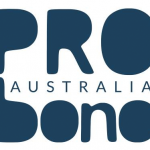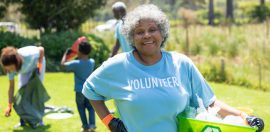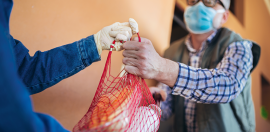How I built a career in gender and international development

3 February 2020 at 7:30 am
Volunteering overseas kick-started Simone Condon’s career in both international development and gender. But what is the role of gender in international development? And how can you use your skills to support gender projects? Here she shares her insights.
I volunteered overseas early in my career and it taught me two very important lessons. The first was that I was inexperienced. The second was that I had a passion and interest for gender equality and human rights.
When I was in university I wanted to be a diplomat. I studied a Masters of International Relations, and aside from a handful of subjects on women and gender, it wasn’t a topic that was on my radar.
I applied for the Australian Volunteers Program because I was interested in getting some in-country work under my belt. With my degree freshly in hand I headed to Papua New Guinea.
You gain so much from volunteering. I could rattle off the objectives of my assignments and I’m sure I ticked most of them off, but really the achievements that stand out to me are the small interactions I had with colleagues.
In the end I completed two volunteer assignments in Papua New Guinea. These two roles put me on the path to working in gender – a field I knew little about, and not somewhere I expected to end up.
As a program officer at Buk bilong Pikinini I supported the team with their work to improve literacy across Papua New Guinea. Through our monitoring and evaluation work, we noticed that the percentage of boys in the classroom was really high.
This was the first time I noticed in practice that development is incredibly gendered. We developed an interview process that better supported girls to join our classes, and introduced a 50 per cent quota for girls in the classroom.
Later at Save the Children I helped with drought response projects, and again noticed the underrepresentation of women, who were not joining our community groups. We developed culturally-sensitive practices to increase their numbers in our drought response groups.
After volunteering I took a job supporting the Fiji Women’s Fund, an Australian government initiative supporting local groups to enhance their work in women’s empowerment and gender equality. The project I was working on was focused on gender equality and women’s rights from a feminist perspective.
The women I worked with were so passionate – something that really rubbed off on me. For my next role I knew I wanted to work in gender, which is why I’m now helping the Australian Volunteers Program strengthen gender equality and women’s rights.
People ask me: what skills are needed to work in a gender role? The most important thing to me is passion. I have broad professional experience, but I don’t have a degree in gender. That said I love my work, and my skills and knowledge in gender have come as a result of my passion. I’ve also been lucky to have had great professional mentors.
You don’t have to be a revolutionary to work in gender – I’m not. I can only speak and act from my own lived experience. But I want to be part of the movement of women and men who are slowly picking away at inequality in any way that they can.
At the Australian Volunteers Program we acknowledge the strong international mandate to work towards gender equality in inclusive, locally-contextualised and safe ways. Working with programs and organisations that support gender justice, women’s rights and the right to live free from violence is something we actively do.
Some of the ways Australian volunteers are currently supporting gender projects overseas include:
- developing targeted materials for women migrant workers in Cambodia;
- producing a strategic plan for a Tanzanian organisation that’s transforming legal, cultural and institutional practices that hinder gender equality and women’s empowerment; and
- supporting more women and girls to play tennis in Fiji.
Roles like these call for technical skills – like communications, organisational strategy, even tennis coaching – but you would not necessarily need targeted gender experience to volunteer in them.
Around the world a range of complex cultural and social traditions and practices means that gender equality isn’t as simple as committing to pay women more. That’s why any work to achieve gender equality and improve women’s rights needs to be locally led, to suit the local context.
If you’re passionate, you can, and will, make positive change.
Find volunteer assignments supporting gender overseas through the Australian Volunteers Program.








